HAT301: Attraction and Event Management - Pyeongchang Case Study
VerifiedAdded on 2022/12/18
|10
|1725
|70
Case Study
AI Summary
This case study analyzes the 2018 Winter Olympics held in Pyeongchang, South Korea, examining the event's life cycle from formation through staging and future development. The report provides an overview of the games, including the events and participating nations. The analysis delves into the formation stage, including the idea, feasibility, and bidding process. The growth stage covers the formation of the organizing committee, venue master plan, and infrastructural developments. The staging stage focuses on event planning, branding, and hosting. The study also provides recommendations for future development, including positioning the destination long-term, post-event venue management, and tourism product development. These recommendations aim to ensure the sustainability of the event and address stakeholder concerns. The analysis is supported by at least eight sources, referenced using the Kaplan Harvard Referencing Guide.
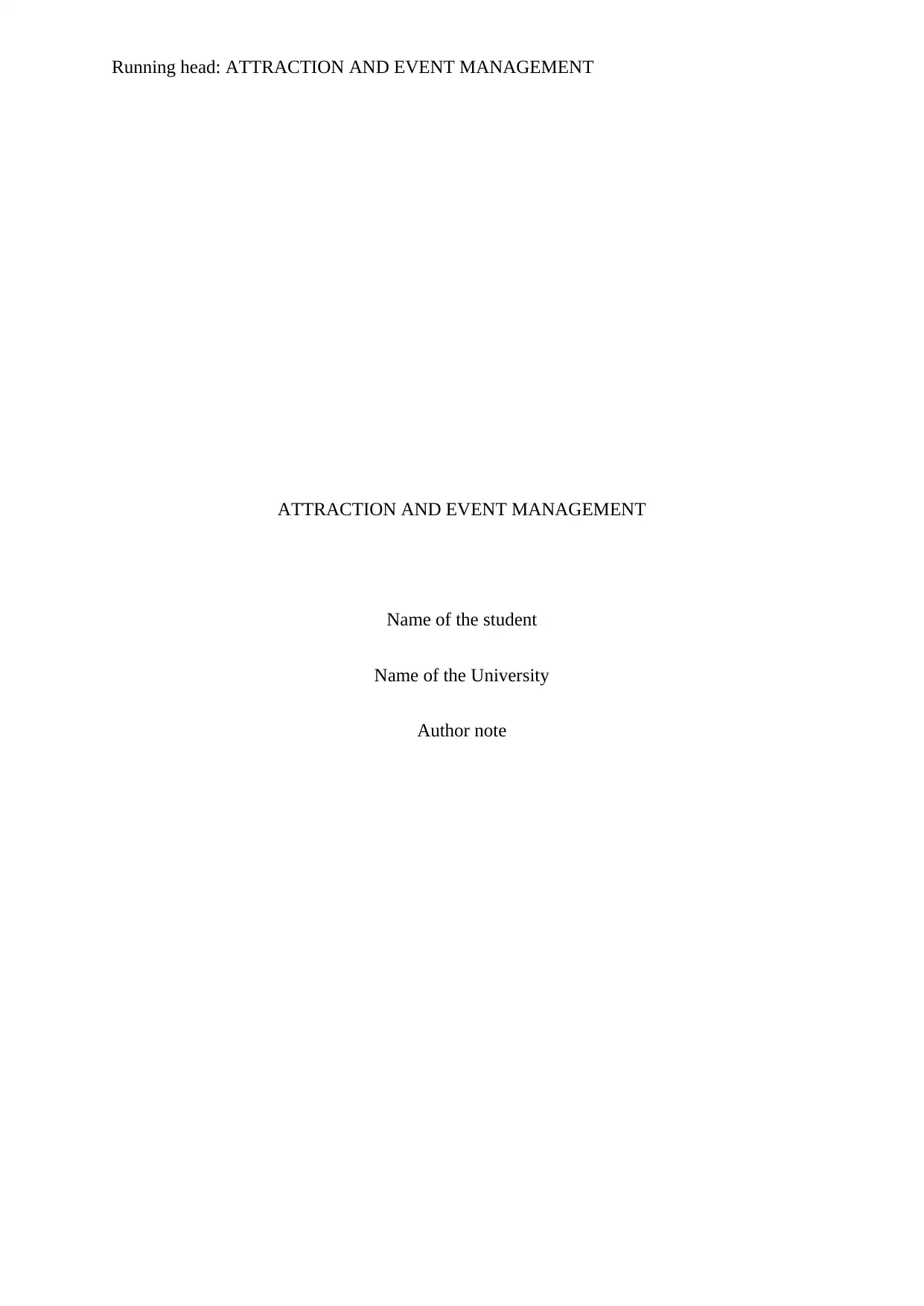
Running head: ATTRACTION AND EVENT MANAGEMENT
ATTRACTION AND EVENT MANAGEMENT
Name of the student
Name of the University
Author note
ATTRACTION AND EVENT MANAGEMENT
Name of the student
Name of the University
Author note
Paraphrase This Document
Need a fresh take? Get an instant paraphrase of this document with our AI Paraphraser
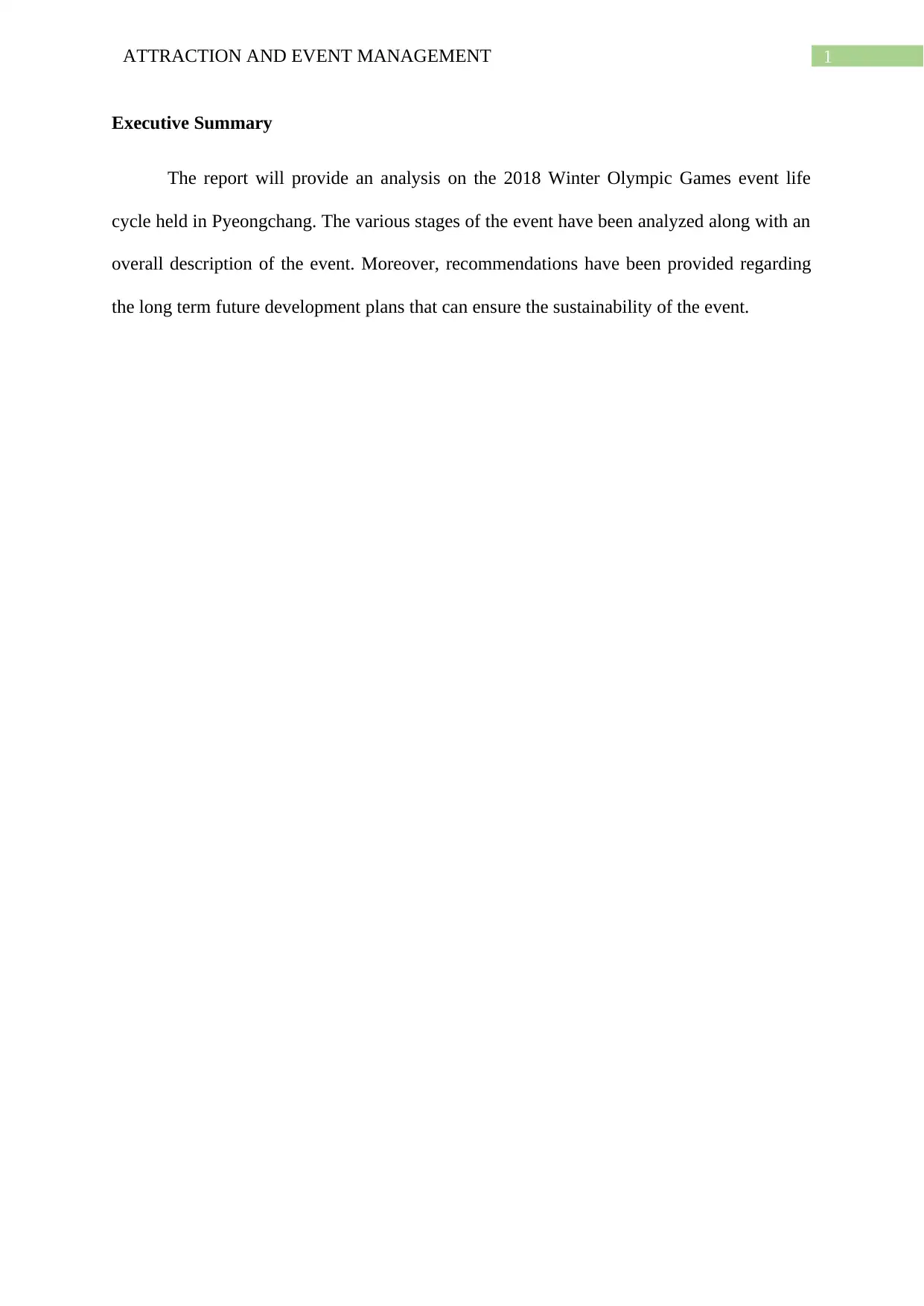
1ATTRACTION AND EVENT MANAGEMENT
Executive Summary
The report will provide an analysis on the 2018 Winter Olympic Games event life
cycle held in Pyeongchang. The various stages of the event have been analyzed along with an
overall description of the event. Moreover, recommendations have been provided regarding
the long term future development plans that can ensure the sustainability of the event.
Executive Summary
The report will provide an analysis on the 2018 Winter Olympic Games event life
cycle held in Pyeongchang. The various stages of the event have been analyzed along with an
overall description of the event. Moreover, recommendations have been provided regarding
the long term future development plans that can ensure the sustainability of the event.
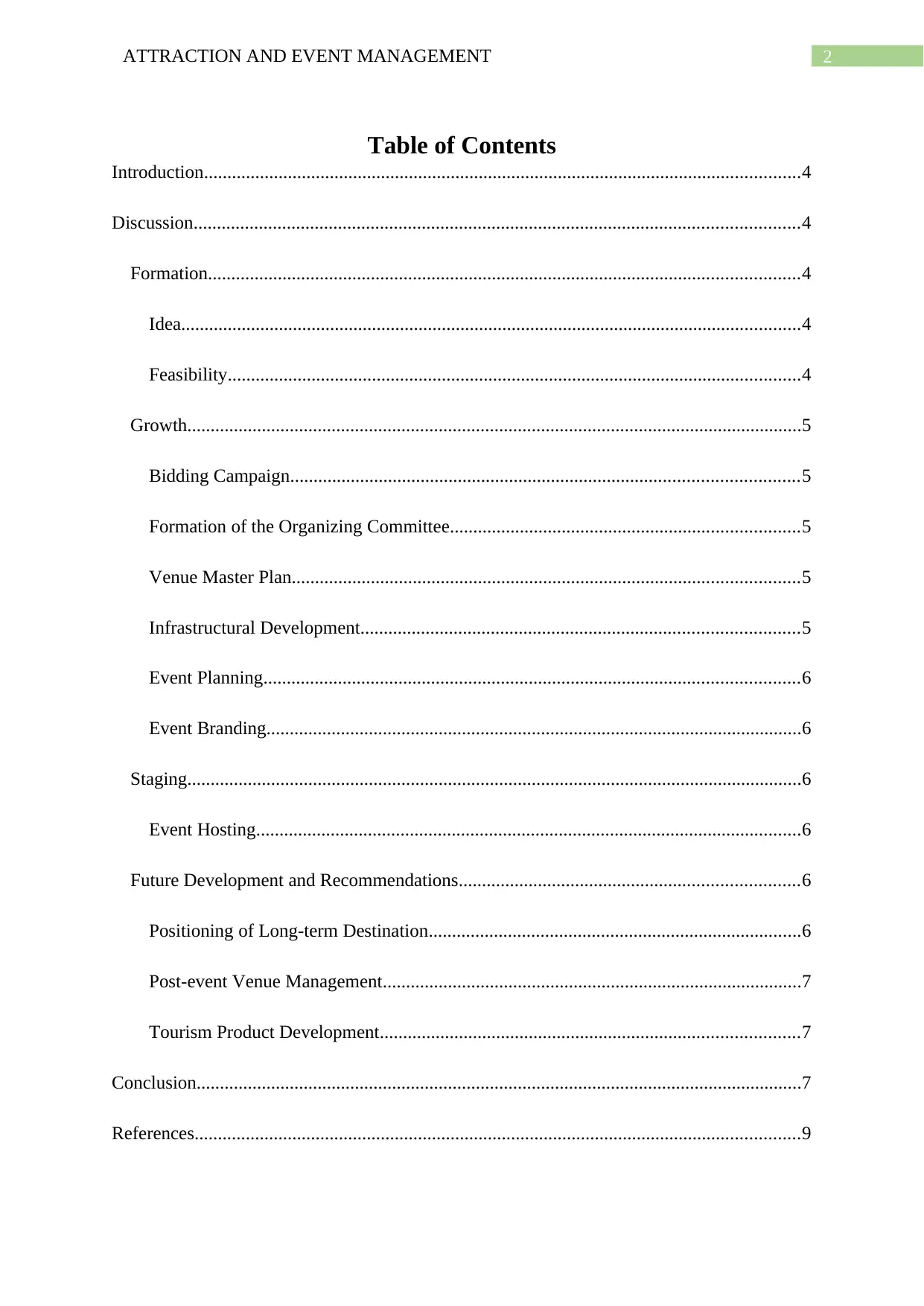
2ATTRACTION AND EVENT MANAGEMENT
Table of Contents
Introduction................................................................................................................................4
Discussion..................................................................................................................................4
Formation...............................................................................................................................4
Idea.....................................................................................................................................4
Feasibility...........................................................................................................................4
Growth....................................................................................................................................5
Bidding Campaign.............................................................................................................5
Formation of the Organizing Committee...........................................................................5
Venue Master Plan.............................................................................................................5
Infrastructural Development..............................................................................................5
Event Planning...................................................................................................................6
Event Branding...................................................................................................................6
Staging....................................................................................................................................6
Event Hosting.....................................................................................................................6
Future Development and Recommendations.........................................................................6
Positioning of Long-term Destination................................................................................6
Post-event Venue Management..........................................................................................7
Tourism Product Development..........................................................................................7
Conclusion..................................................................................................................................7
References..................................................................................................................................9
Table of Contents
Introduction................................................................................................................................4
Discussion..................................................................................................................................4
Formation...............................................................................................................................4
Idea.....................................................................................................................................4
Feasibility...........................................................................................................................4
Growth....................................................................................................................................5
Bidding Campaign.............................................................................................................5
Formation of the Organizing Committee...........................................................................5
Venue Master Plan.............................................................................................................5
Infrastructural Development..............................................................................................5
Event Planning...................................................................................................................6
Event Branding...................................................................................................................6
Staging....................................................................................................................................6
Event Hosting.....................................................................................................................6
Future Development and Recommendations.........................................................................6
Positioning of Long-term Destination................................................................................6
Post-event Venue Management..........................................................................................7
Tourism Product Development..........................................................................................7
Conclusion..................................................................................................................................7
References..................................................................................................................................9
⊘ This is a preview!⊘
Do you want full access?
Subscribe today to unlock all pages.

Trusted by 1+ million students worldwide
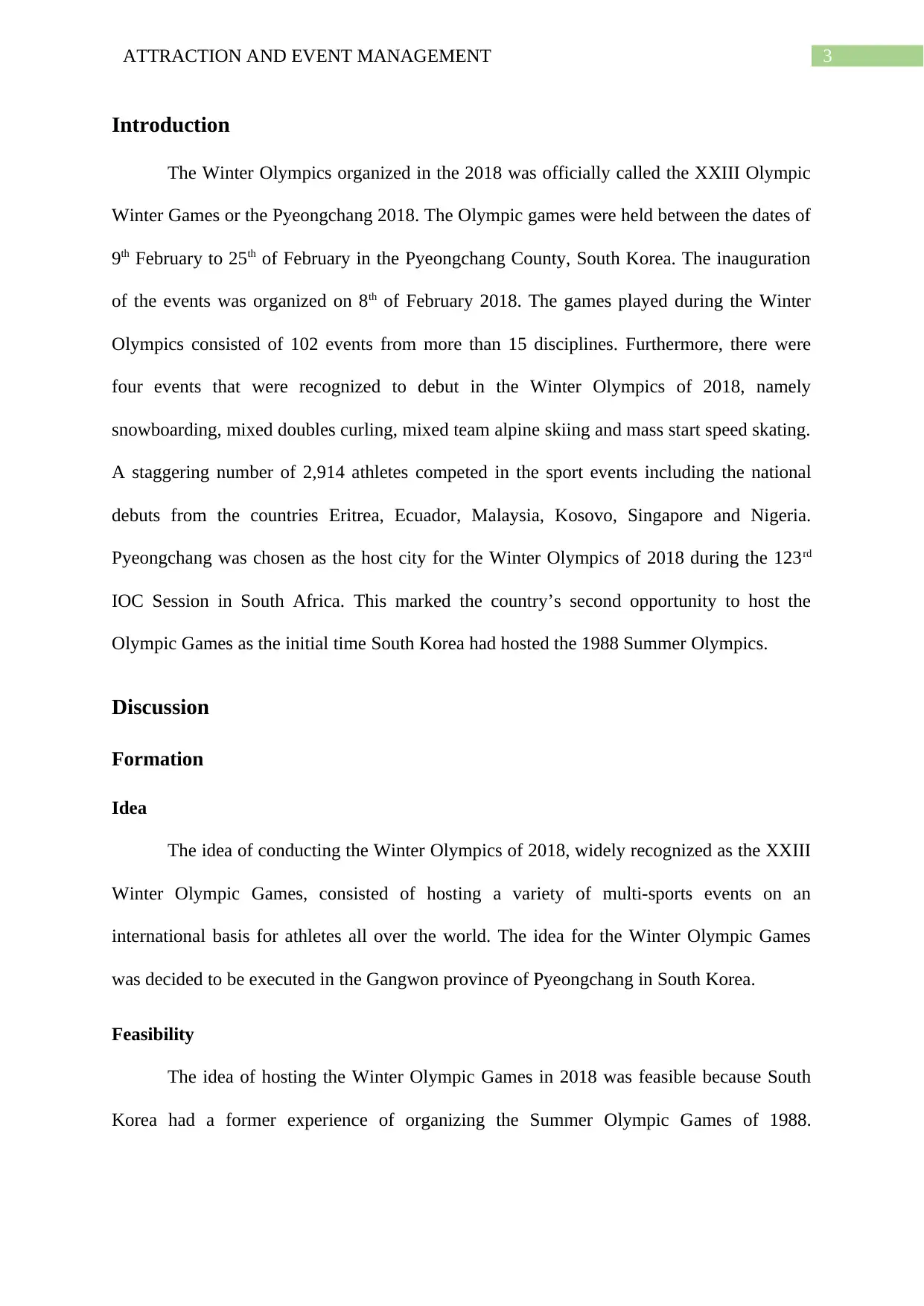
3ATTRACTION AND EVENT MANAGEMENT
Introduction
The Winter Olympics organized in the 2018 was officially called the XXIII Olympic
Winter Games or the Pyeongchang 2018. The Olympic games were held between the dates of
9th February to 25th of February in the Pyeongchang County, South Korea. The inauguration
of the events was organized on 8th of February 2018. The games played during the Winter
Olympics consisted of 102 events from more than 15 disciplines. Furthermore, there were
four events that were recognized to debut in the Winter Olympics of 2018, namely
snowboarding, mixed doubles curling, mixed team alpine skiing and mass start speed skating.
A staggering number of 2,914 athletes competed in the sport events including the national
debuts from the countries Eritrea, Ecuador, Malaysia, Kosovo, Singapore and Nigeria.
Pyeongchang was chosen as the host city for the Winter Olympics of 2018 during the 123rd
IOC Session in South Africa. This marked the country’s second opportunity to host the
Olympic Games as the initial time South Korea had hosted the 1988 Summer Olympics.
Discussion
Formation
Idea
The idea of conducting the Winter Olympics of 2018, widely recognized as the XXIII
Winter Olympic Games, consisted of hosting a variety of multi-sports events on an
international basis for athletes all over the world. The idea for the Winter Olympic Games
was decided to be executed in the Gangwon province of Pyeongchang in South Korea.
Feasibility
The idea of hosting the Winter Olympic Games in 2018 was feasible because South
Korea had a former experience of organizing the Summer Olympic Games of 1988.
Introduction
The Winter Olympics organized in the 2018 was officially called the XXIII Olympic
Winter Games or the Pyeongchang 2018. The Olympic games were held between the dates of
9th February to 25th of February in the Pyeongchang County, South Korea. The inauguration
of the events was organized on 8th of February 2018. The games played during the Winter
Olympics consisted of 102 events from more than 15 disciplines. Furthermore, there were
four events that were recognized to debut in the Winter Olympics of 2018, namely
snowboarding, mixed doubles curling, mixed team alpine skiing and mass start speed skating.
A staggering number of 2,914 athletes competed in the sport events including the national
debuts from the countries Eritrea, Ecuador, Malaysia, Kosovo, Singapore and Nigeria.
Pyeongchang was chosen as the host city for the Winter Olympics of 2018 during the 123rd
IOC Session in South Africa. This marked the country’s second opportunity to host the
Olympic Games as the initial time South Korea had hosted the 1988 Summer Olympics.
Discussion
Formation
Idea
The idea of conducting the Winter Olympics of 2018, widely recognized as the XXIII
Winter Olympic Games, consisted of hosting a variety of multi-sports events on an
international basis for athletes all over the world. The idea for the Winter Olympic Games
was decided to be executed in the Gangwon province of Pyeongchang in South Korea.
Feasibility
The idea of hosting the Winter Olympic Games in 2018 was feasible because South
Korea had a former experience of organizing the Summer Olympic Games of 1988.
Paraphrase This Document
Need a fresh take? Get an instant paraphrase of this document with our AI Paraphraser
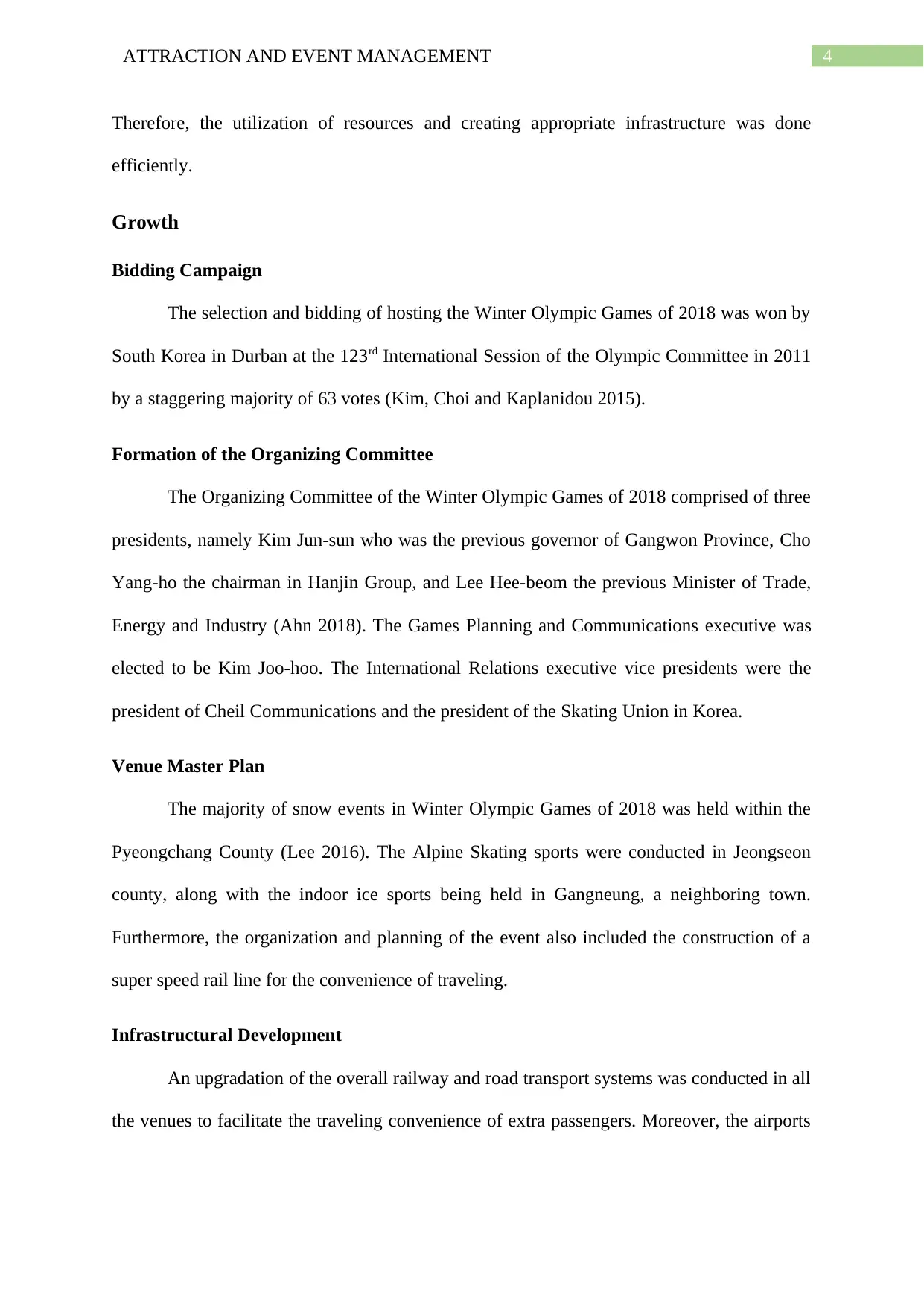
4ATTRACTION AND EVENT MANAGEMENT
Therefore, the utilization of resources and creating appropriate infrastructure was done
efficiently.
Growth
Bidding Campaign
The selection and bidding of hosting the Winter Olympic Games of 2018 was won by
South Korea in Durban at the 123rd International Session of the Olympic Committee in 2011
by a staggering majority of 63 votes (Kim, Choi and Kaplanidou 2015).
Formation of the Organizing Committee
The Organizing Committee of the Winter Olympic Games of 2018 comprised of three
presidents, namely Kim Jun-sun who was the previous governor of Gangwon Province, Cho
Yang-ho the chairman in Hanjin Group, and Lee Hee-beom the previous Minister of Trade,
Energy and Industry (Ahn 2018). The Games Planning and Communications executive was
elected to be Kim Joo-hoo. The International Relations executive vice presidents were the
president of Cheil Communications and the president of the Skating Union in Korea.
Venue Master Plan
The majority of snow events in Winter Olympic Games of 2018 was held within the
Pyeongchang County (Lee 2016). The Alpine Skating sports were conducted in Jeongseon
county, along with the indoor ice sports being held in Gangneung, a neighboring town.
Furthermore, the organization and planning of the event also included the construction of a
super speed rail line for the convenience of traveling.
Infrastructural Development
An upgradation of the overall railway and road transport systems was conducted in all
the venues to facilitate the traveling convenience of extra passengers. Moreover, the airports
Therefore, the utilization of resources and creating appropriate infrastructure was done
efficiently.
Growth
Bidding Campaign
The selection and bidding of hosting the Winter Olympic Games of 2018 was won by
South Korea in Durban at the 123rd International Session of the Olympic Committee in 2011
by a staggering majority of 63 votes (Kim, Choi and Kaplanidou 2015).
Formation of the Organizing Committee
The Organizing Committee of the Winter Olympic Games of 2018 comprised of three
presidents, namely Kim Jun-sun who was the previous governor of Gangwon Province, Cho
Yang-ho the chairman in Hanjin Group, and Lee Hee-beom the previous Minister of Trade,
Energy and Industry (Ahn 2018). The Games Planning and Communications executive was
elected to be Kim Joo-hoo. The International Relations executive vice presidents were the
president of Cheil Communications and the president of the Skating Union in Korea.
Venue Master Plan
The majority of snow events in Winter Olympic Games of 2018 was held within the
Pyeongchang County (Lee 2016). The Alpine Skating sports were conducted in Jeongseon
county, along with the indoor ice sports being held in Gangneung, a neighboring town.
Furthermore, the organization and planning of the event also included the construction of a
super speed rail line for the convenience of traveling.
Infrastructural Development
An upgradation of the overall railway and road transport systems was conducted in all
the venues to facilitate the traveling convenience of extra passengers. Moreover, the airports
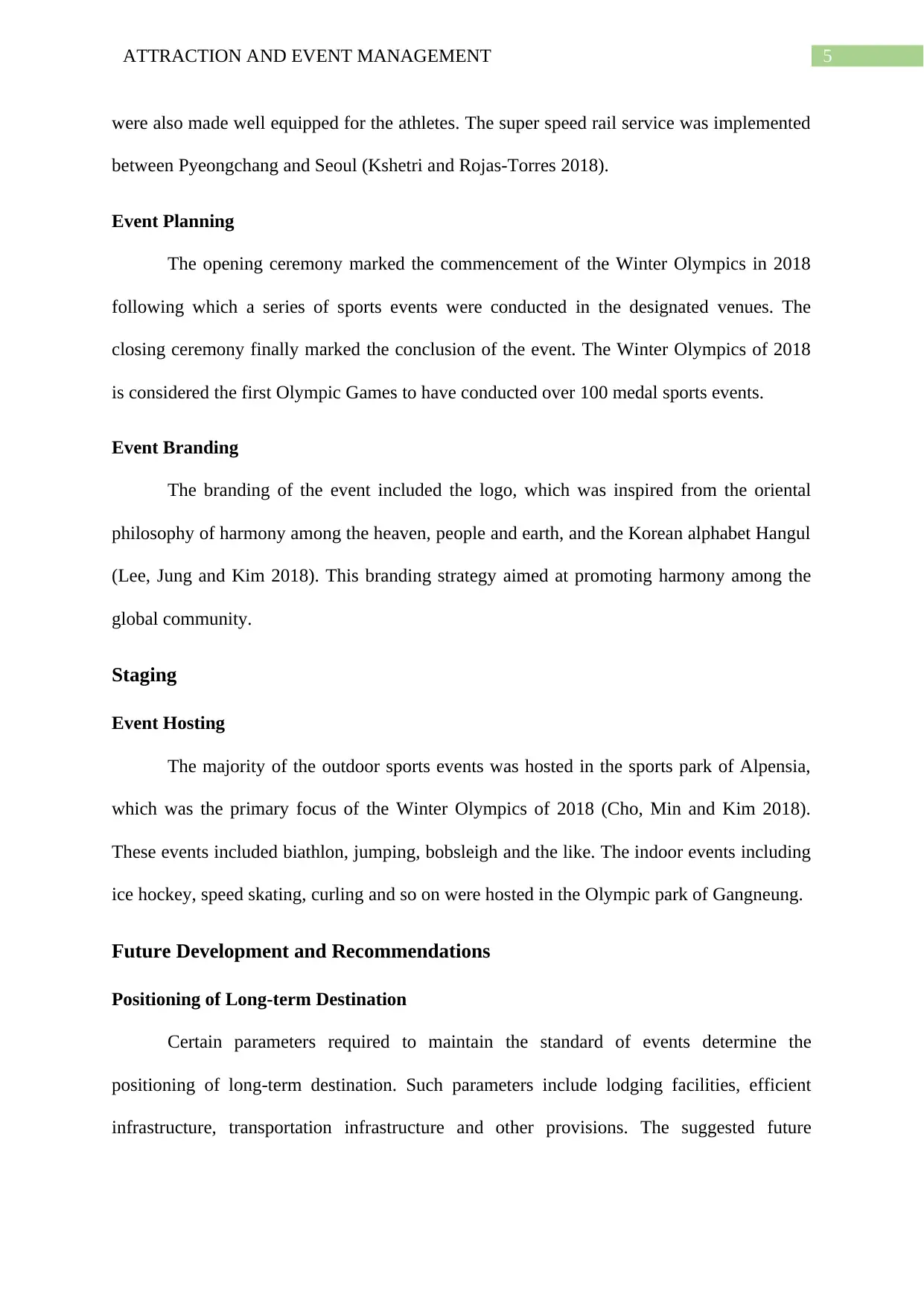
5ATTRACTION AND EVENT MANAGEMENT
were also made well equipped for the athletes. The super speed rail service was implemented
between Pyeongchang and Seoul (Kshetri and Rojas-Torres 2018).
Event Planning
The opening ceremony marked the commencement of the Winter Olympics in 2018
following which a series of sports events were conducted in the designated venues. The
closing ceremony finally marked the conclusion of the event. The Winter Olympics of 2018
is considered the first Olympic Games to have conducted over 100 medal sports events.
Event Branding
The branding of the event included the logo, which was inspired from the oriental
philosophy of harmony among the heaven, people and earth, and the Korean alphabet Hangul
(Lee, Jung and Kim 2018). This branding strategy aimed at promoting harmony among the
global community.
Staging
Event Hosting
The majority of the outdoor sports events was hosted in the sports park of Alpensia,
which was the primary focus of the Winter Olympics of 2018 (Cho, Min and Kim 2018).
These events included biathlon, jumping, bobsleigh and the like. The indoor events including
ice hockey, speed skating, curling and so on were hosted in the Olympic park of Gangneung.
Future Development and Recommendations
Positioning of Long-term Destination
Certain parameters required to maintain the standard of events determine the
positioning of long-term destination. Such parameters include lodging facilities, efficient
infrastructure, transportation infrastructure and other provisions. The suggested future
were also made well equipped for the athletes. The super speed rail service was implemented
between Pyeongchang and Seoul (Kshetri and Rojas-Torres 2018).
Event Planning
The opening ceremony marked the commencement of the Winter Olympics in 2018
following which a series of sports events were conducted in the designated venues. The
closing ceremony finally marked the conclusion of the event. The Winter Olympics of 2018
is considered the first Olympic Games to have conducted over 100 medal sports events.
Event Branding
The branding of the event included the logo, which was inspired from the oriental
philosophy of harmony among the heaven, people and earth, and the Korean alphabet Hangul
(Lee, Jung and Kim 2018). This branding strategy aimed at promoting harmony among the
global community.
Staging
Event Hosting
The majority of the outdoor sports events was hosted in the sports park of Alpensia,
which was the primary focus of the Winter Olympics of 2018 (Cho, Min and Kim 2018).
These events included biathlon, jumping, bobsleigh and the like. The indoor events including
ice hockey, speed skating, curling and so on were hosted in the Olympic park of Gangneung.
Future Development and Recommendations
Positioning of Long-term Destination
Certain parameters required to maintain the standard of events determine the
positioning of long-term destination. Such parameters include lodging facilities, efficient
infrastructure, transportation infrastructure and other provisions. The suggested future
⊘ This is a preview!⊘
Do you want full access?
Subscribe today to unlock all pages.

Trusted by 1+ million students worldwide
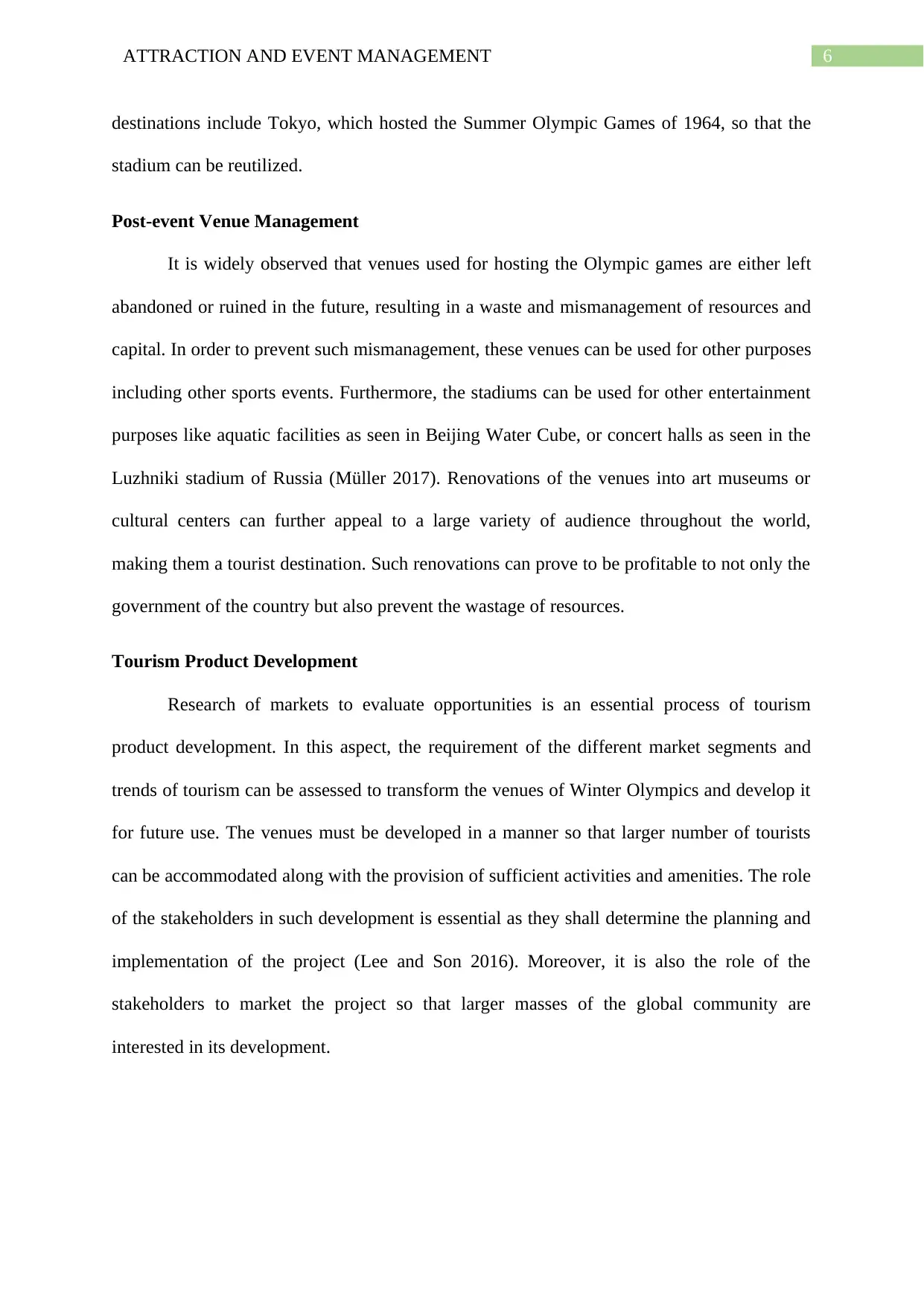
6ATTRACTION AND EVENT MANAGEMENT
destinations include Tokyo, which hosted the Summer Olympic Games of 1964, so that the
stadium can be reutilized.
Post-event Venue Management
It is widely observed that venues used for hosting the Olympic games are either left
abandoned or ruined in the future, resulting in a waste and mismanagement of resources and
capital. In order to prevent such mismanagement, these venues can be used for other purposes
including other sports events. Furthermore, the stadiums can be used for other entertainment
purposes like aquatic facilities as seen in Beijing Water Cube, or concert halls as seen in the
Luzhniki stadium of Russia (Müller 2017). Renovations of the venues into art museums or
cultural centers can further appeal to a large variety of audience throughout the world,
making them a tourist destination. Such renovations can prove to be profitable to not only the
government of the country but also prevent the wastage of resources.
Tourism Product Development
Research of markets to evaluate opportunities is an essential process of tourism
product development. In this aspect, the requirement of the different market segments and
trends of tourism can be assessed to transform the venues of Winter Olympics and develop it
for future use. The venues must be developed in a manner so that larger number of tourists
can be accommodated along with the provision of sufficient activities and amenities. The role
of the stakeholders in such development is essential as they shall determine the planning and
implementation of the project (Lee and Son 2016). Moreover, it is also the role of the
stakeholders to market the project so that larger masses of the global community are
interested in its development.
destinations include Tokyo, which hosted the Summer Olympic Games of 1964, so that the
stadium can be reutilized.
Post-event Venue Management
It is widely observed that venues used for hosting the Olympic games are either left
abandoned or ruined in the future, resulting in a waste and mismanagement of resources and
capital. In order to prevent such mismanagement, these venues can be used for other purposes
including other sports events. Furthermore, the stadiums can be used for other entertainment
purposes like aquatic facilities as seen in Beijing Water Cube, or concert halls as seen in the
Luzhniki stadium of Russia (Müller 2017). Renovations of the venues into art museums or
cultural centers can further appeal to a large variety of audience throughout the world,
making them a tourist destination. Such renovations can prove to be profitable to not only the
government of the country but also prevent the wastage of resources.
Tourism Product Development
Research of markets to evaluate opportunities is an essential process of tourism
product development. In this aspect, the requirement of the different market segments and
trends of tourism can be assessed to transform the venues of Winter Olympics and develop it
for future use. The venues must be developed in a manner so that larger number of tourists
can be accommodated along with the provision of sufficient activities and amenities. The role
of the stakeholders in such development is essential as they shall determine the planning and
implementation of the project (Lee and Son 2016). Moreover, it is also the role of the
stakeholders to market the project so that larger masses of the global community are
interested in its development.
Paraphrase This Document
Need a fresh take? Get an instant paraphrase of this document with our AI Paraphraser
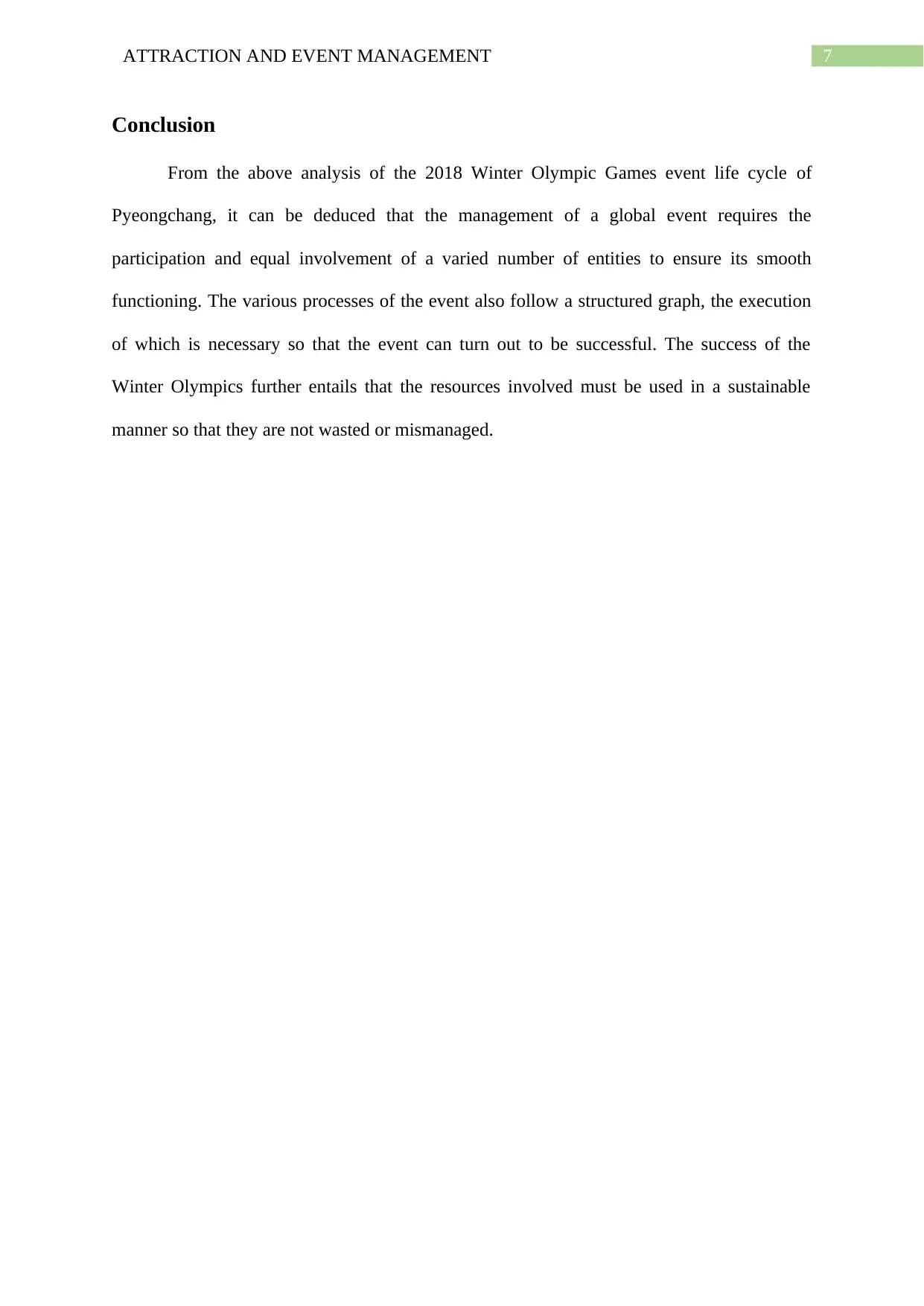
7ATTRACTION AND EVENT MANAGEMENT
Conclusion
From the above analysis of the 2018 Winter Olympic Games event life cycle of
Pyeongchang, it can be deduced that the management of a global event requires the
participation and equal involvement of a varied number of entities to ensure its smooth
functioning. The various processes of the event also follow a structured graph, the execution
of which is necessary so that the event can turn out to be successful. The success of the
Winter Olympics further entails that the resources involved must be used in a sustainable
manner so that they are not wasted or mismanaged.
Conclusion
From the above analysis of the 2018 Winter Olympic Games event life cycle of
Pyeongchang, it can be deduced that the management of a global event requires the
participation and equal involvement of a varied number of entities to ensure its smooth
functioning. The various processes of the event also follow a structured graph, the execution
of which is necessary so that the event can turn out to be successful. The success of the
Winter Olympics further entails that the resources involved must be used in a sustainable
manner so that they are not wasted or mismanaged.
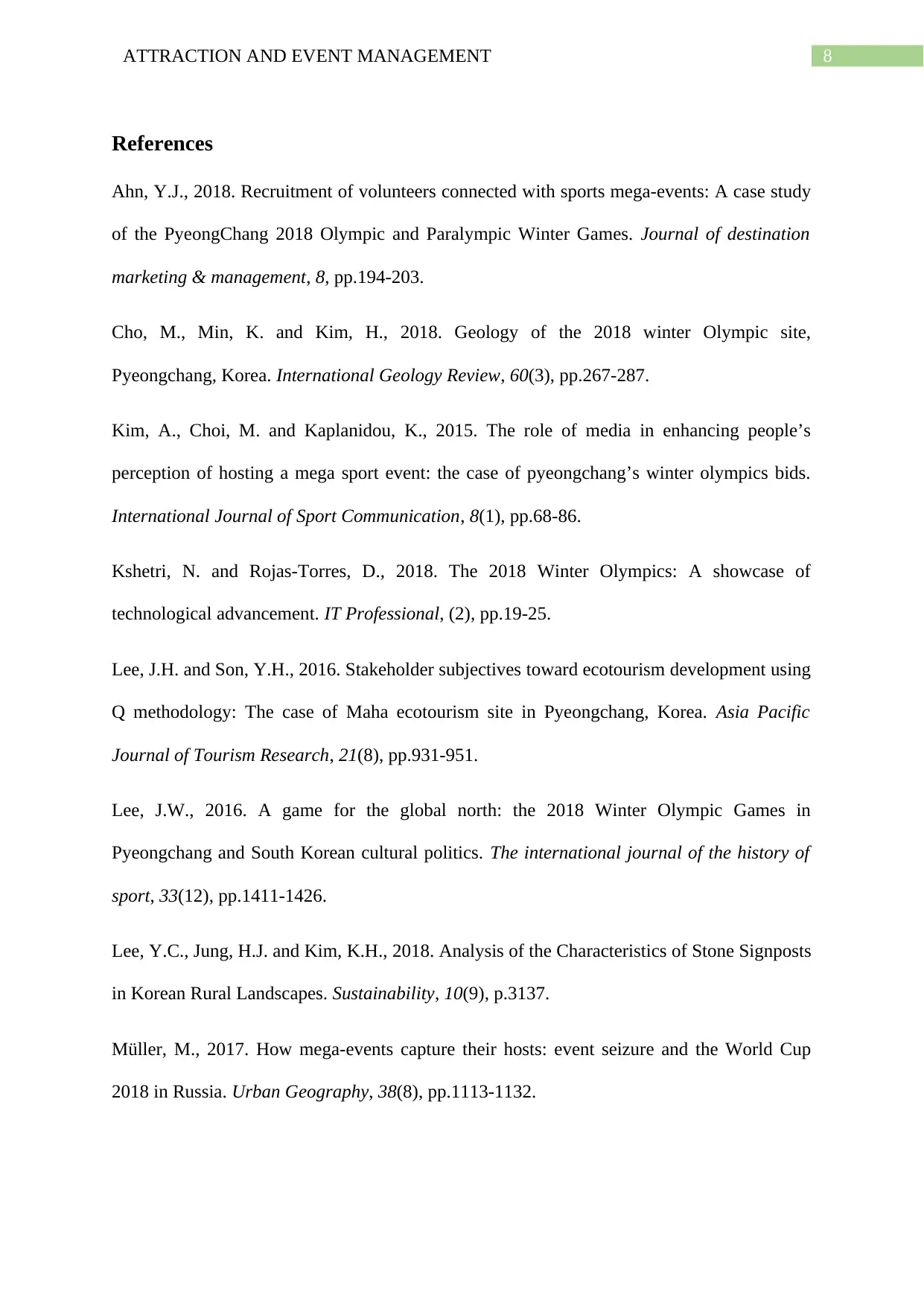
8ATTRACTION AND EVENT MANAGEMENT
References
Ahn, Y.J., 2018. Recruitment of volunteers connected with sports mega-events: A case study
of the PyeongChang 2018 Olympic and Paralympic Winter Games. Journal of destination
marketing & management, 8, pp.194-203.
Cho, M., Min, K. and Kim, H., 2018. Geology of the 2018 winter Olympic site,
Pyeongchang, Korea. International Geology Review, 60(3), pp.267-287.
Kim, A., Choi, M. and Kaplanidou, K., 2015. The role of media in enhancing people’s
perception of hosting a mega sport event: the case of pyeongchang’s winter olympics bids.
International Journal of Sport Communication, 8(1), pp.68-86.
Kshetri, N. and Rojas-Torres, D., 2018. The 2018 Winter Olympics: A showcase of
technological advancement. IT Professional, (2), pp.19-25.
Lee, J.H. and Son, Y.H., 2016. Stakeholder subjectives toward ecotourism development using
Q methodology: The case of Maha ecotourism site in Pyeongchang, Korea. Asia Pacific
Journal of Tourism Research, 21(8), pp.931-951.
Lee, J.W., 2016. A game for the global north: the 2018 Winter Olympic Games in
Pyeongchang and South Korean cultural politics. The international journal of the history of
sport, 33(12), pp.1411-1426.
Lee, Y.C., Jung, H.J. and Kim, K.H., 2018. Analysis of the Characteristics of Stone Signposts
in Korean Rural Landscapes. Sustainability, 10(9), p.3137.
Müller, M., 2017. How mega-events capture their hosts: event seizure and the World Cup
2018 in Russia. Urban Geography, 38(8), pp.1113-1132.
References
Ahn, Y.J., 2018. Recruitment of volunteers connected with sports mega-events: A case study
of the PyeongChang 2018 Olympic and Paralympic Winter Games. Journal of destination
marketing & management, 8, pp.194-203.
Cho, M., Min, K. and Kim, H., 2018. Geology of the 2018 winter Olympic site,
Pyeongchang, Korea. International Geology Review, 60(3), pp.267-287.
Kim, A., Choi, M. and Kaplanidou, K., 2015. The role of media in enhancing people’s
perception of hosting a mega sport event: the case of pyeongchang’s winter olympics bids.
International Journal of Sport Communication, 8(1), pp.68-86.
Kshetri, N. and Rojas-Torres, D., 2018. The 2018 Winter Olympics: A showcase of
technological advancement. IT Professional, (2), pp.19-25.
Lee, J.H. and Son, Y.H., 2016. Stakeholder subjectives toward ecotourism development using
Q methodology: The case of Maha ecotourism site in Pyeongchang, Korea. Asia Pacific
Journal of Tourism Research, 21(8), pp.931-951.
Lee, J.W., 2016. A game for the global north: the 2018 Winter Olympic Games in
Pyeongchang and South Korean cultural politics. The international journal of the history of
sport, 33(12), pp.1411-1426.
Lee, Y.C., Jung, H.J. and Kim, K.H., 2018. Analysis of the Characteristics of Stone Signposts
in Korean Rural Landscapes. Sustainability, 10(9), p.3137.
Müller, M., 2017. How mega-events capture their hosts: event seizure and the World Cup
2018 in Russia. Urban Geography, 38(8), pp.1113-1132.
⊘ This is a preview!⊘
Do you want full access?
Subscribe today to unlock all pages.

Trusted by 1+ million students worldwide

9ATTRACTION AND EVENT MANAGEMENT
1 out of 10
Related Documents
Your All-in-One AI-Powered Toolkit for Academic Success.
+13062052269
info@desklib.com
Available 24*7 on WhatsApp / Email
![[object Object]](/_next/static/media/star-bottom.7253800d.svg)
Unlock your academic potential
Copyright © 2020–2026 A2Z Services. All Rights Reserved. Developed and managed by ZUCOL.





